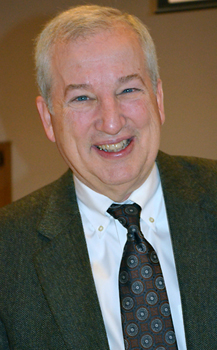Eastern Washington Legislative Conference 2015: Raising Prophetic voices
Speakers tell of ways to address wealth inequality
Even though wealth is generated by labor, Dan Morrissey, who teaches corporate law at the Gonzaga University Law School, said wealth has gone to capitalists/owners since the beginning of industrial society.
 |
|---|
| Dan Morrissey, Gonzaga University Law School |
He was speaking on “Wealth Inequality” at the Jan. 31 Eastern Washington Legislative Conference.
Working people earned more of a fair share for about 30 years after World War II, from the late 1940s to the 1970s, he said, telling of the widespread prosperity he observed growing up in Chicago because of the work of unions.
In those years, corporate executives made 30 times what their workers did. In the last two years, they have earned an average of 350 times what workers earn.
“In the 1990s, there was also growth in medium-income households, peaking at $57,000, but now it’s down to $52,000. There is false prosperity in terms of household incomes,” Dan said. “In Spokane, the average household income is $42,000.”
He said that wealth distribution is back where it was in the 1920s before the Great Depression with the top one percent controlling 40 percent of the wealth, the next nine percent controlling 35 percent of wealth, so the top 10 percent control 75 percent of the wealth, and the top 25 percent control 90 percent of the wealth.
When two major tool companies recently merged, they laid off several thousand workers, while the co-CEOS continued to earn $30 million and $40 million, Dan reported.
Paul Benz, co-director of the Faith Action Network of Washington (FAN), said that in advocacy statewide, “We talk of reducing the wealth inequality. Income inequality is wide enough, but when we deal with wealth inequality we also deal with racial inequities.”
FAN is supporting four bills that address wage theft, two bills on minimum wage and one bill on increasing jobs in the African-American community.
“Wage theft” he said refers to various ways employers avoid paying what an employee is owed.
“The vast majority of businesses do an excellent job, but still, too many are getting away with wage theft,” he said.
Examples include misclassifying independent contractors or unreported wages, such as for undocumented workers.
On minimum wage, Paul said that even though Washington has the highest one in the United States, a family with an adult and child needs to earn $22,000 a year to make a basic living.
Dan suggested that businesses that do not pay a large enough minimum wage, especially while corporate executives earn so much, should not be in business.
Asked about how the state government contributes to income inequality related to the sales tax and regressive taxes, Paul said that FAN has long supported reforming the state tax structure. The way to move toward an income tax is by electing more legislators who favor it.
Dan pointed out that the top U.S. tax rate is 39.6 percent on incomes above $457,000. In Great Britain and Canada, the top rate is 50 percent.
Paul called for educating people in congregations about why taxes are important.
Dan talked of a movement for corporate responsibility, in which there is a triple “bottom line” considered that includes environment and social responsibility, as well as profit.
For information, call 206-625-9790 or email dmorrissey@lawschool.gonzaga.edu.
Copyright ©March 2015 - The Fig Tree






